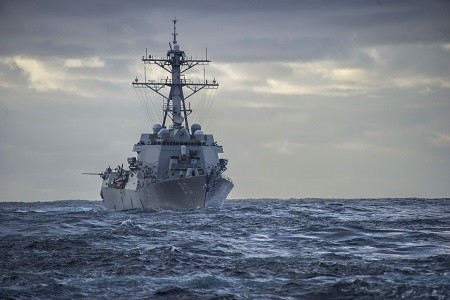
After years of experiments, scientists from the U.S Navy believe that they have finally resolved one of the greatest problems faced by the military: how to turn seawater into fuel.
With the development of a liquid hydrocarbon fuel, scientists could now aid in easing out military's dependence on oil fuels. It is called the "game changer," as it could now help military ships to produce their own fuel, which in turn would help them stay operational at any point of time.
The cost of the newly developed fuel is about $3 to $6 per gallon, according to the U.S. Naval Research Laboratory.
At present, 289 navy vessels depend on oil-base fuel, whereas 72 submarines and some aircraft carriers rely on nuclear propulsion. With the development of the new fuel, dependence on oil-based fuel would reduce and would in turn free the military from fluctuations in fuel price and shortage.
"It's a huge milestone for us. We are in very challenging times where we really do have to think in pretty innovative ways to look at how we create energy, how we value energy and how we consume it. We need to challenge the results of the assumptions that are the result of the last six decades of constant access to cheap, unlimited amounts of fuel." Defense News quoted Philip Cullom, Vice Adm.
The breakthrough came after military scientists found a way to extract hydrogen gas and carbon dioxide from seawater. The gases are then converted into a fuel through gas-to-liquids process aided with catalytic converters.
"For the first time we've been able to develop a technology to get CO2 and hydrogen from seawater simultaneously. That's a big breakthrough." said Dr Heather Willauer, a research chemist who was involved with the project.
"For us in the military, in the navy, we have some pretty unusual and different kinds of challenges. We don't necessarily go to a gas station to get our fuel. Our gas station comes to us in terms of an oiler, a replenishment ship. Developing a game-changing technology like this, seawater to fuel, really is something that reinvents a lot of the way we can do business when you think about logistics, readiness." said Cullom.
Navy's next challenge is to produce the fuel for industrial purposes. It is also expected that they will collaborate with universities in order to increase the amount of CO2 and carbon that can be recaptured.
(Edited by Anu James)















